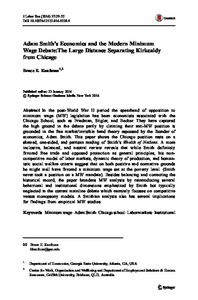Adam Smith's economics and the modern minimum wage debate: the large distance separating Kirkcaldy from Chicago

2016
37
1
Winter
29-52
economic model ; economic theory ; minimum wage
Wages and wage payment systems
http://dx.doi.org/10.1007/s12122-016-9220-9
English
Bibliogr.
"In the post-World War II period the spearhead of opposition to minimum wage (MW) legislation has been economists associated with the Chicago School, such as Friedman, Stigler, and Becker. They have captured the high ground in the debate partly by claiming their anti-MW position is grounded in the free market/invisible hand theory espoused by the founder of economics, Adam Smith. This paper shows the Chicago position rests on a skewed, one-sided, and partisan reading of Smith's Wealth of Nations. A more inclusive, balanced, and neutral review reveals that while Smith definitely favored free trade and opposed protection as general principles, his non-competitive model of labor markets, dynamic theory of production, and humanistic social welfare criteria suggest that on both positive and normative grounds he might well have favored a minimum wage set at the poverty level. (Smith never took a position on a MW mandate). Besides balancing and correcting the historical record, the paper broadens MW analysis by reintroducing several behavioral and institutional dimensions emphasized by Smith but typically neglected in the current mainline debate which narrowly focuses on competitive versus monopsony models. A Smithian analysis also has several implications for findings from empirical MW studies."
Digital
The ETUI is co-funded by the European Union. Views and opinions expressed are however those of the author(s) only and do not necessarily reflect those of the European Union or the ETUI.